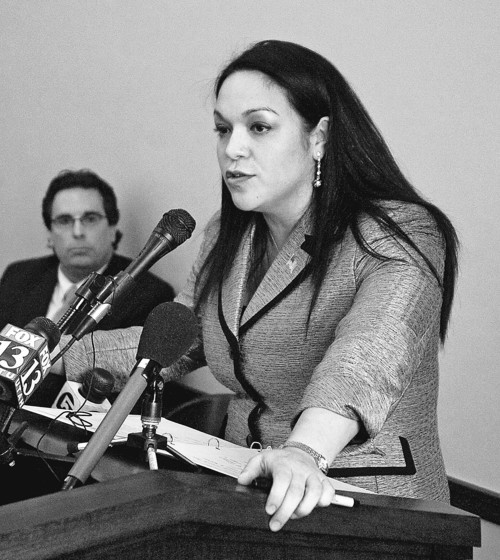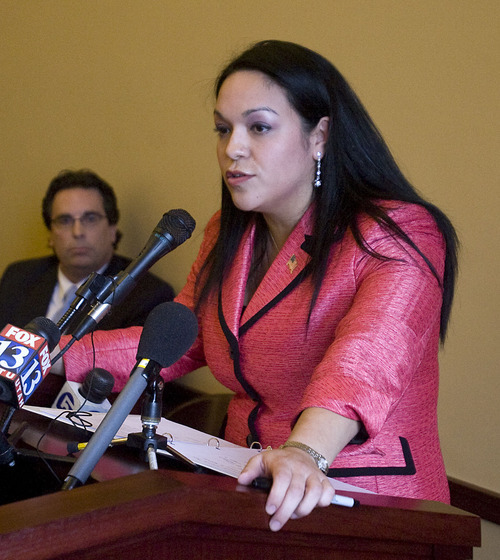This is an archived article that was published on sltrib.com in 2010, and information in the article may be outdated. It is provided only for personal research purposes and may not be reprinted.
Undocumented immigrants in Utah would be required to carry a state-issued permit, learn English and be subject to criminal-background checks, while employers would face financial penalties for hiring those without the permits, under a bill unveiled Tuesday by state Sen. Luz Robles.
The 21-page draft of the Utah Pilot Accountability Permit Program essentially puts the onus on the undocumented immigrants to come forward, register for an "accountability card" and emerge from the shadows of society. It is being framed as an alternative to Rep. Stephen Sandstrom's enforcement-only bill modeled after the controversial Arizona immigration law that requires local police to check the legal status of those suspected of criminal activity or committing an infraction.
"This is a better solution to a broken immigration policy and a more realistic solution as well," said Robles, D-Salt Lake City.
She estimated there are 110,000 undocumented immigrants in the state of Utah.
Robles said her bill is tougher than that of Sandstrom, R-Orem, whose proposal is a catch-and-release plan that will eventually be rejected in federal court. Portions of Arizona's law have already been ruled unconstitutional by a federal judge.
But Cherilyn Eagar, a leader at the Utah Coalition on Illegal Immigration, said its members continue to back Sandstrom's bill because it targets criminals.
"If they are here and they are undocumented, they are not here legally," Eagar said. "If they are working and undocumented, they are committing felonies. So I don't know who they are planning on identifying, other than those who are committing crime, and that's why we need Sandstrom's bill."
Under provisions in the Robles bill, undocumented immigrants would have to pass a background check before qualifying for a permit to live and work in Utah. The background checks would be run through the state Department of Public Safety and the national Secure Communities system.
That program allows for fingerprints to be crosschecked with immigration and FBI databases. U.S. Immigration and Customs Enforcement can look at prints to determine what enforcement actions must be taken — including deportation.
"By the time the bill goes active, the [federal] databases will be international, with lots of participating countries," said Dimitri Mumulidisz, executive director of the Democratic Lawyers Council. "We will know within hours if they've committed a felony in their home country."
The issuing of the accountability cards would then be done through a yet-to-be-created arm of the state Department of Public Safety. Undocumented immigrants would have to keep them at all times. Each card is valid for two years and would have to be renewed.
No fiscal startup costs have been projected for the creation of a new state agency, but Mumulidisz said the bill would eventually have a positive revenue stream for Utah, as the undocumented immigrants obtain permits, get on tax rolls and raise wages for those currently being exploited by businesses hiring them.
Mumulidisz said the penalties for employers hiring those without the permit would be a staggered scale — with the first person illegally hired subjecting the company to a $10,000 fine. The second person illegally hired would bring a higher fine — though the actual scale hasn't been defined.
The permits would also be issued on a tiered basis. For those here longer than 18 months, they'd get a Type A permit that would enable the holder to legally work for any business registered through the program. Those here less than 18 months would get a Type B permit, requiring the name and address of the business for which a worker provides services.
Paul Mero, president of The Sutherland Institute — a conservative think tank — said the bill offers total accountability to undocumented immigrants and employers.
"It prescribes, in no uncertain terms, that if you're an undocumented immigrant in Utah, you'll either proudly carry an accountability card or you won't," Mero said. "If you do, you're welcome among us. If you don't, you're not welcome among us. It's that simple."
He also said it's a clear alternative to Sandstrom's bill.
"This bill should be passed, and Representative Sandstrom's bill should not be touched," Mero said.
The English requirement would put undocumented immigrants in classes, and they'd have to prove proficiency in the language as a part of getting and maintaining a permit. They would also have to pay for the classes, though Mumulidisz said the Catholic Church is offering some for free.
Mumulidisz stressed the bill isn't an "immigration bill" and said it doesn't create a guest-worker program, a path to citizenship or amnesty because the issue of immigration remains a federal one.
Instead, he said, immigrants can be afforded the same minimum benefits under federal law. The bill would also seek federal waivers for the residents to live and work in Utah without deportation concerns — assuming they pass the background checks.
Mero added that even if Utah isn't granted the waiver, it would move forward with the law and deal with possible lawsuits that course of action might bring. —
Robles' bill
The legislation would:
Enact Identity Enforcement Act.
Require individuals to present photographic document if subject to lawful stop, detention or arrest by law enforcement officer.
Require fingerprinting and photographing under certain circumstances.
Require establishment of a database.
Provide for the sharing of information with federal agencies under certain circumstances.
Require the governor to petition necessary waivers, exemptions or authority to implement program.
Require worker to carry permits at all times.
Impose financial penalties for businesses hiring nonpermitted undocumented workers.





